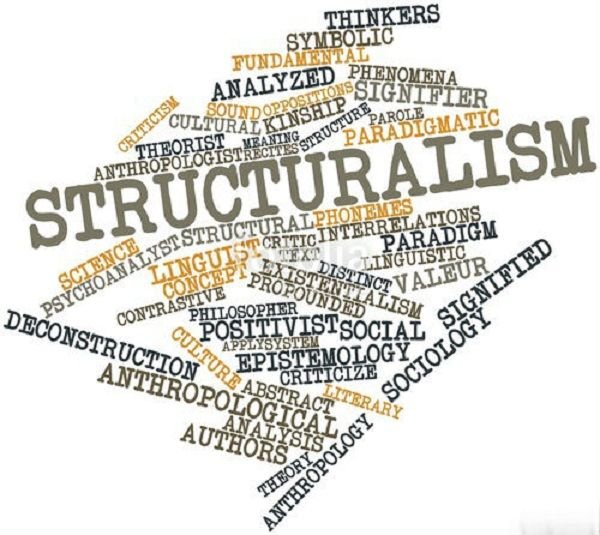The emergence of structuralism
Prerequisites for the formation of structuralism as a philosophical teaching. Structuralism is one of the two philosophical teachings of the 20th century that arose after the Second World War. In the second half of the 20th century there was a rapid development of social sciences, with the exception of history as a science, the rest of the social and humanitarian knowledge began in the mid-19th century. A long period in the natural sciences prevails over the public. After the two World Cataclysms, there is a growing interest in the study of society. At the same time, after the World War One , especially after the World War Two, the value system of enlightenment collapsed. The phrase "Social Order of the Age" appears. This reflects the period of the complete celebration of ideologies, and at the same time the need for a prudent humanization of human relations deeply damaged by the two world wars appears.

The scientific and historical roots of structuralism. Structurality as a peculiar worldview (still not a philosophy) emerged in the Middle Ages under the influence of the idea and practice of a hierarchically built society. As society is built on the principle of the united beginning: one God, one deputy to the earth, one secular ruler and after them the whole system of hierarchical relations. During this period there are different views of the structure, but the most typical of them is: "structure is the form that organizes the content of things." With the entry into the New Age period, the structure problem disappeared from social science to emerge in the early 19th century when chemistry became a leading science amongst all others. The main task of chemistry is to study the construction of the substance from the atomic to the supermolecular. A decisive step towards the return of structuralism to a strictly philosophical doctrine was done by the Swiss Ferdinand de Saussure. He rejected the philology as a historical science until then. It separates language from its social context, explores language itself, outside the social context. Language develops, but not under the influence of external factors, but by some internal logic that derives from the specificity of its structure /
Direct predecessors and chief representatives of structuralism. The foundations of structuralism as a philosophy were laid by two Russian emigrants after the October Revolution. They concentrate their attention on the problem of structure, what are the general rules for the existence of each structure. After VW, structuralism developed mainly in France, as its representatives were Claude Strauss, Michel Foucault, Jacques and Julia Krasteva.
A general characteristic of structuralism
The philosophical problem - the essence, but the meaning of certain phenomena begins to be sought, the sense is always revealed by comparison of the studied phenomenon with another, which determines its significance. The philosophical problem of structuralism is the relationship between part and whole. Structurality is shaped as a scientific direction mainly in humanitarian knowledge, it becomes a philosophical doctrine when it seeks the distinctive features of the structure as such irrelevant to the concrete realization of this structure. In philosophy, structuralism appears as an attempt to overcome the differences and oppositions of empirical-descriptive on the one hand with the abstract-theoretical activity of others. This experience has been made first of all in structural linguistics.

Philosophical specifics of structuralism
The notion of structure - the structure is a set of durable connections existing in certain objects, phenomena that ensure the existence of their basic properties. In modern science, and hence in philosophy, the notion of structure is associated primarily with concepts of organization, system and function. Unlike the structure (internal structure), the system also combines the variables of a given phenomenon. The best example in this respect is the society, which is made up of many sustainable links from different structures - economic, political, cultural, financial, etc. All together with the transient phenomena associated with them constitute the given public system. The essential links between the different elements of the system answer the question of how it exists.
Types of structural analysis - there are two types of analyzes, stemming from the concept of structure, system-structural and structural-functional. The system-structural analysis divides the research process into two stages: first, research into all the elements of the phenomenon, the study identifies the structural elements of the structure, ie the sustainable construction of the phenomena, and then goes back to the evaluation of the variables complementary to the structural characteristics. In psychology, disclosure of the structure is inevitably related to the peculiarities of the personality's behavior. The persistent elements in this case are the moral structure, the rational, the cognitive. The philosophical assumption in this case is that complementary characteristics that are not related to the structure by virtue of some unmistakable necessity may appear around the sustainable structure. The other approach - the structural-functional one passes through three stages, first is the procedure of separating a primary set of elements that are assumed to have a unified structure; second - the division into parts of the studied object as a whole and the third - the revelation of the relations between the parts in their dynamics. In psychology, dynamics is mostly associated with personality behavioral responses under certain conditions.
The main drawback of structuralism is its tendency to reduce the phenomena studied to a schematic static situation, so the pursuit of philosophy is to reveal the mechanism and the possible reasons for changing the structure, ie to reveal the relativity of structural resilience and invariability. For the disclosure of structural dynamics, the notion of function is introduced, in short, the function is the serving role that one phenomenon plays against others. And every phenomenon, without exception, has such an official role. The function reveals the dependencies of the elements within a system. A systematic-structured approach is often used to shift away from sub-substantive science. On the other hand, the structural and functional approach aims to displace the dynamic historical-comparative approach. Functionalism is aimed at opposing historicism. A trivial fact is that the world is a dynamic system. The question is whether this dynamics has a direction, a tendency, whether the world has an evolution from the simpler to the more complex or the world in its entirety is a closed, non-developing, though dynamic system. The intention of structuralists to overcome the concept of essence, in essence, we have an indisputable accurate characteristic that dictates the appearance of the phenomenon. In psychological practice, it means from one personally psychological type (introvert / extrovert) to deduce all other characteristics and hence the expected behavior of the personality. The structural approach is more complex as it regards the "essence" as a structurally organized entity, while the dynamically understood structure implies the great importance of the external impact on the psychological structure of the personality.
Hey, it's me again ! :-)

I can always learn a lot when visiting you.. you do put a lot of effort into your posts.. it is appreciated !
Thank you, @agneslaczo :P
Well, I am trying to write valuable content for the others :D
By the way... because you live in Hungary I want to ask you - have you watch one brilliant Hungary movie On Body and Soul/Teströl és lélekröl? This is my favorite foreign movie for this year :)
as sad as it is, i have not seen it ... :-(
i wonder why is it your favorite. if i watch it, will you tell me ? :-)
Haha, yes :D First you must watch it :D
Ah, honestly I came in search of followers, but it's so lovely to see people actually posting meaningful, useful, and somewhat original posts. Cheers man. Ofc, I would love a follow+a read of my posts if the time is available sir godflesh :)
Great post. Structuralism was really a big breakthrough back in the day and to be honest, it's still not so out dated today.
Yes I think the same, before years I have study many things about structuralism :)
The phrase "Social Order of the Age" appears. This reflects the period of the complete celebration of ideologies.
A trivial fact is that the world is a dynamic system.
Very good blog, sir.
Thanks a lot, sir.
No problem :)
Great post,
please upvote, comment, and follow me I'm going to follow you
:)
maybe only scientists who have deeper knowledge are very interesting this paper for me thanks.
heh, cool :)
good post, interesting information, I liked it. I wish you good luck and have a nice day
Thank you very much :)
It is really a nice writing. Structuralism is the branch of reality.
true :)
Thanks @Godflesh That was informative.
Thanks for sharing!
You are welcome :)